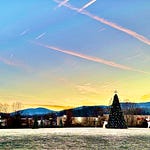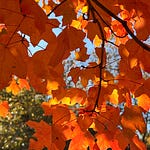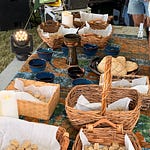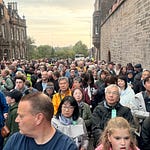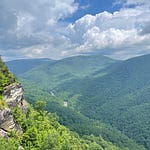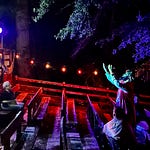On Thursday this week, we celebrate the Feast of the Ascension. It’s a big celebration in the church that some of us may miss because it doesn’t land on a Sunday. But we do mention it every Sunday as part of the Nicene Creed when we say:
“He ascended into Heaven and is seated at the right hand of the Father.”
So even though we may not frequently celebrate the Ascension together, we do acknowledge it all the time. The Ascension happens forty days after Easter, ten days before Pentecost. We might think of it as the start of a time of waiting and anticipation for when the Holy Spirit shows up to the party, week after next.
Even more obscure on the Christian calendar are Rogation Days. Those are the Monday, Tuesday, and Wednesday before Ascension Day. Because Ascension Day is Thursday, we have an opportunity to explore these days together this week. Rogation Days come from the Latin word rogare, which means “to ask.” At the root, Rogation is a springtime festival for agricultural and fishing communities, where the prayers are about preparing the earth for planting, the sea for fishing, and the parish for newness of life. We’re asking God to bless the land and sea where we are—for those things to be good to us, to be fertile, to accept the seeds we’re planting and the lines we’re casting and the labor we’re doing. And that we will be good to those things as well: stewards of what we’ve been given—land, water, people, bodies, time.
Rogation Days are also about addressing the conflicts we have with our neighbors. We can imagine the Medieval world a bit and understand quickly the absolute, critical role our neighbors and our environment played in our survival. In those days, if the lambs weren’t born healthy, if the rains didn’t come, if the horses went lame or the grain spoiled—it could mean real suffering. The community had to be in sync: with each other, with the land, and with God. We need each other. And we need this world to go right. And sometimes we have to make things right with the people and the environments around us.
Some churches take up the old Medieval practice of saying special prayers as they walk around the bounds of the parish each day for the three Rogation Days. It used to be that the priest would “beat the bounds” of the parish to bless the good stuff happening in it and to ward off the bad stuff. And if you’re into any of this, I invite you to join me the next few mornings doing a little Rogating—around our Garden of Eatin’ out back, which will start to bear fruit in just a couple of weeks, but also around the whole campus. Just meet me after church and we’ll pick a time. And if you can’t do that, I invite you to crack open your Book of Common Prayer and maybe say one of the prayers for Rogation Days as you walk around your place. Pray for things to go right.
Of course, in earlier days, the parish was not just the church property. It was your whole neighborhood or regional community. It could stretch over several hills of countryside or several blocks in a city or village. These days, our parish bounds extend all over the region—from beyond the Cape Fear River, north to Dunn and Cameron, west toward Hoke and Moore Counties, and south to the Lumber River. And our streaming broadcast makes it even further. Perhaps worship for you this week would be beating the bounds of the parish by going for a drive, stopping a time or two to see what’s going on within the bounds of our community, and asking for whatever it is you hope for to be blessed and stewarded well—for things to go right. And maybe—although this is much harder—you will seek out a place somewhere on your journey throughout our wide, wide parish, and actually do the work of making things right: the apology you need to make, the waste you need to eliminate, the emotional or spiritual or material garden you need to tend, the seed of hope you need to plant, the conflict you need to resolve.
There are folks who have gone before us we can ask to show us the way.
Within the bounds of our parish are the ancestral lands of the Tuscarora, Catawba, and Lumbee peoples, who have stewarded this region and its ecosystems across generations. We can learn, with humility, our interconnectedness and the fragility of our relationships by honoring their presence and stewardship of this place—and the ongoing conflicts this land has seen. That’s another thing you can do in your drives and walks around your places this week. And another way we can begin to make things right.
What does all this have to do with the Ascension?
Let me go back to the Creed for a second. You may know that we’re celebrating the birthday of the Nicene Creed this year. It is 1700 years old this summer. The Council of Nicea started gathering on May 20th in the year 325 and spent all summer working through the church conflicts and needs that had made the Council necessary. The Nicene Creed is part of what they came up with. And we know what it says:
He came down from Heaven and became incarnate. Was crucified, died, and was buried. Descended to the Dead. On the third day he rose again, in accordance with the Scriptures.
These last few weeks, we’ve celebrated that last bit I mentioned—Easter. The resurrected Jesus has been with us. Showing up with us wherever we are. Resurrected. With Mary in the garden. On the road to Emmaus. In a room with the disciples. With Thomas. With Peter on the shore of the lake. All over.
After a lifetime of joining us and laboring with us as a human and as a resurrected being, Ascension Day is about Jesus taking that humanity with him to Heaven and sitting there with and as God. “He is seated at the right hand of the Father,” we say. Our shared humanity is up there—just like Jesus brought divinity down here. And there’s a sense that things will be all right, and are all right, when we hold those realities together. God is entrusting us—as God entrusted those before us—to make good on what we have. And our job is to proceed with the dirty, prayerful, asking, calloused, Rogating hands to do the work.
Rogation Days and Ascension Day talk to each other. Our work and labor and ecosystems and relationships are now infused with the Divine. And our God is infused with humanity. It’s a holy new reality where God is both with us in our work and reigning over all. God is with us here, and we are there—up there, out there—with God. Through Jesus.
But some days, all this is just too much. We aren’t rising. And we aren’t reigning. The idea of Incarnation down here and Ascension up there is great on paper and may even be our Creed, but we still have to deal with folks who voted for the other person. We still read headlines about the contamination of the Cape Fear River. We still see, within the bounds of our parish, crisis after crisis. Conflict. Homelessness. The people who cut me off in traffic. The inability to manage the bills this month. The prospect of job loss. The plague of loneliness and isolation running through our communities. The death of truths we hold in common. And these things can leave us not knowing what to do or where to go for help. And it can mean we’re not helpful to others. Some days, paralysis might be the only response we know how to have.
In today’s Gospel reading, we meet a man suffering from this very condition. A man whose life is lived in Rogation Days—on the ground, toiling. Jesus tells him, “Take up your mat and walk.” That’s not just healing. That is an Ascension move. You were down here. You were lying on the mat of grief, of fear, of exhaustion, of addiction to busy lives. Some of that is sacred work, but it may wear you out.
Take up your mat, coil it up under your arm, and—this week—let’s walk the boundaries. God is calling us to higher things. Start climbing.
Note: The text and audio above is from a sermon delivered at Holy Trinity Episcopal Church in Fayetteville, North Carolina, based on readings for the Sixth Sunday of Easter, Year C. The text above has been updated slightly to reflect that Ascension Day always lands on a Thursday. The recording is unclear about that. Please forgive my hasty oversight.




